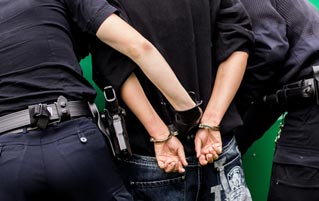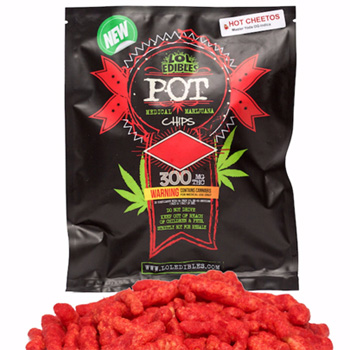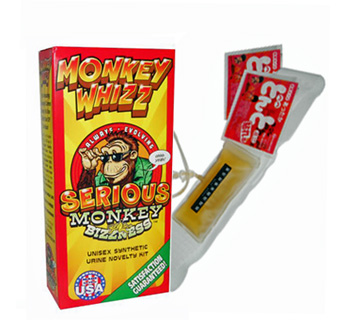How Flawed Drug Testing Can Ruin Your Life

The War on Drugs might be the most irrational, idiotic campaign America has waged over the last century or so, but some of the people involved are very rational non-idiots. They're drug chemists, in lab coats, and they're the ones testing the evidence that might send you to prison. So at least this process is completely fair and unbiased, right? Eh, you can probably guess the answer.
We talked to "Ross," who works out of a government lab in a major American city. He gave us his insider perspective on exactly what drug testing is like, and how deeply the worst parts of the system might screw you.
Police "Drug Tests" Aren't Drug Tests At All
When the cops stop your car, they might do an on-the-spot drug test of an item. Or your workplace might run a quick test on your pee if your boss is in a particularly bad mood. As you might have heard, these tests can go hilariously wrong. Every so often, we get a story about someone accused of doing heroin because they ate a poppy seed bagel. The issue here isn't that science is totally stumped when it comes to testing drugs; the issue is that these tests aren't really drug tests at all.
They're more like pre-tests. They spot the apparent presence of a class of drugs, purely to tell the lab which confirmatory test to run next. So when analyzing urine, Ross keeps seeing samples that come up as meth on the first round (the "presumptive test"), and then he does the confirmatory test and discovers Sudafed instead, or Adderall. In the old days, screen tests would even flag ibuprofen as marijuana. This is all fine as long as authorities follow through with the confirmatory test ... which they sometimes don't.
It's a problem all over the country, says Ross, especially in small towns. Police do a roadside drug test from a $2 kit and charge a suspect without ever getting it confirmed. One district attorney Ross worked with used these presumptive tests exclusively. "Even after my supervisor explained to him why he couldn't jail people based on those test, that DA just ignored us and kept on. Dude wanted convictions, not exonerations." Plus, police aren't scientists and might just plain do the test wrong. "I guess the lesson here for readers confronted with a screen test result," he says, "is if you know you're not taking drugs, don't confess or acquiesce until it's sent off for confirmation testing."
For example: Police in Texas once did a test on a mysterious material they found in a suspect's car, and their roadside kit called it methamphetamine. They threw the guy in lock-up, but then the confirmation test determined that the substance was kitty litter.
You Can Be Charged For Way More Drugs Than You Actually Have On You
When you hear someone was caught trucking seven kilograms of cocaine, the reality might be a little different from what you're picturing. Thanks to the way the law works in many states, that person is charged for the coke they were carrying as well as for everything the drug was cut with. "If 7 kilos are 100 percent pure cocaine, it's 10-99 years," says Ross. "If they're 5 percent cocaine, same thing. If I had a kilo of caffeine and mixed in a thimble of cocaine, I just made a kilo of cocaine under the law."
Why is that a problem? Well, take the following example, based on a real case. You're prescribed Percocet for an injury, and you keep taking it afterward because Percocet is addictive (a problem society has really got to work on). Police catch you with ten tablets. Each contains 10 milligrams of oxycodone, plus 650 milligrams of other stuff. But you get charged as though the entire thing is an opium derivative, as if you were carrying 6.6 grams of pure heroin. You get a minimum sentence of 70 months, plus a fine of $50,000. If that's not terrifying enough, let's up the number of tablets to 38. You'd now get over 18 years minimum in prison and a $500,000 fine. That's roughly the same as for trafficking 1,000 ecstasy pills, or 10,000 pounds of marijuana.
It's also true that you can get charged for microscopic traces of drugs -- say, residue in a baggie. If you're lucky, you'll get written up for drug paraphernalia, but you might instead get charged with drug possession and become a felon over 0.01 grams of heroin. Now listen to what happens when we combine microscopic drug traces with those aggregate weight laws:
"I once had about two grams of poorly made fake Xanax come in," says Ross. "These white tablets crumbled into powder easily, and my presumptive analysis only showed inert fillers." But the suspect had stuck these tablets of his in a baggie that once held heroin, so when Ross did more detailed tests to identify the fillers, he detected a tiny heroin trace. "Even though, based on my experience, I knew what the situation was, I couldn't prove which nano-specks of white powder were the heroin among the rest of the evidence. So guess what they got charged with?"
And speaking of huge charges over nothing ...
We Go To Absurd Lengths To Test For Marijuana ... And Even Testers Know This Is Crazy
If you're expecting drug testers to fiercely defend current drug laws, think again. "Most of us in this field hate marijuana being a DEA Schedule 1 controlled substance," says Ross. "Even freaking cocaine is a lower Schedule 2." A drug is supposed to be marked as Schedule 1 only when it has no accepted medical use, has a high abuse potential, and comes with a major lack of safety. Marijuana misses every one of those criteria. So why is it Schedule 1? "The short answer is ignorance, with a dash of mid-20th-century racism."
But the law's the law, so drug testers like Ross have to exhaustively analyze every suspected marijuana sample with the same scientific precision as potentially lethal substances like fentanyl -- even products sold legally in a neighboring state. Even packaged and labeled edibles, which openly advertise that they contain THC.
In Ross's state, THC -- the psychoactive compound in cannabis -- is categorized differently from marijuana and carries a different sentence. So drug testers must dig though brownies and vape liquid for microscopic traces of cannabis plant, because the penalty changes depending on whether they can confirm the THC came from cannabis. This happens to be one of the few situations in which those bizarre aggregate weight rules can help you.
Say they catch you with 450 grams of THC candy. The sentence for that quantity of THC is 5-99 years. But if Ross can discover any bits of botanical cannabis in there, the candy counts as marijuana, not THC. It's just 15.75 ounces, making it a lower state jail felony. It would take 2,000 pounds of candy classified as marijuana to get the same sentence as 450 grams classified as THC.
If you're re-reading that paragraph trying to make sense of those rules, honestly, you're wasting your time. Now imagine your lawyer trying to explain it to you while your hands are in cuffs.
Some People In The Field Simply Make Results Up
While we were interviewing Ross, one of his co-workers was fired for faking results. They had worked for over 21 years, and now they're blacklisted from forensics forever. "Our lab's reputation is tarnished," says Ross. "We have to rework their cases, and defense lawyers will try to shred us on the stand because of it." The offense? "Dry labbing."
The phrase comes from back when all kinds of analysis involved wet chemistry. When you tested something, it would get wet. If it's dry, you never tested it. "This term really came into the nomenclature for us in the 1980s because of Fred Zain, a disgraced lab tech who was a prosecutor's best friend. His work always led to the result they needed for a conviction. Always." A couple of decades ago, Zain was the go-to example for bad ethics in forensics, but he pales in comparison to a couple of new examples from just this past decade.
Annie Dookhan and Sonja Farak were lab workers at separate Massachusetts drugs labs, and they each faked loads of results. Between the two of them, around 54,000 convictions may now have to be overturned. "Dookhan was trying be the best no matter what," says Ross. "Farak loved all the free drugs. Both intentionally falsified results, one to boost her numbers and the other to hide her habit."
But since the two did get caught in the end, there's a silver lining to all this. "Because of them, the crime lab system in Massachusetts is making needed bottom-up changes that frankly should already have been there." How many more corrupt testers are still out there is, of course, impossible to know.
Scientists Are In A Secret Arms Race Over Making And Catching Fake Urine
When Ross was working in a urine testing lab, some guy tried to sneak in fake piss to pass his test. "He put it in a travel size shampoo bottle," he says, "and stored it snugly up his asshole." But after he'd emptied his pockets at the front desk and went into the bathroom to fill the cup, he ran into a problem: He couldn't get the bottle out. He evidently dug in with his fingers, but to no avail. So he moved on to the Valsalva maneuver, which meant holding his breath and pushing. This squeezed the bottle out ... along with the entire remaining contents of his lower intestine. He then zipped up and just left. He did not get the job.
"Though disgusting," says Ross, "this got me thinking about the lengths people would go through to trick their way past a test." Labs are always prepared for a little fraud. They check a whole bunch of factors to make sure that the liquid in the specimen cup really is fresh, all-natural urine. "The usual tricks of adding bleach, diluting with toilet water, switching out with a closely colored beverage, or bringing in room-temperature urine get caught easily. But what about the fake urine made specifically to pass our tests?"
Fake urine very much does exist. You can buy it online. You can also buy it in smoke shops or sex shops, where it will be marked for novelty or fetish use. Ross managed to get a budget approved and bought ten brands of this fake urine at a nearby smoke shop. ("Are you planning on having a party?" asked the heavily pierced and tattooed checkout lady with a wink.)
He tested them all. "Most had some kind of hand warmer to bring the fake urine up to temp. Others relied on keeping the urine strapped to your inner thigh to get up to body temp." So that took care of temperature, the first hurdle. They were also the right color. Ross ran through the other tests -- pH, specific gravity, the oxidant test, the creatinine test. "Lo and behold, eight out ten of the goddamn things passed. Like for real, these work as (not) advertised."
So could Ross devise a better test to catch even the most sophisticated fake urine? "I eventually did," he says. His method involves searching for a pee compound called urobilinogen, which can't be stored for extended periods and can't be cheaply synthesized. The chemical Ehrlich's reagent tests whether a tube of maybe-urine contains urobilinogen. Note: We are not giving you this information so you can go out and create a better, foolproof type of fake urine. Although, well, we can't stop you from trying.
A Lot Of Drugs Out There Are Fakes, Making Them Potentially Lethal
We admittedly have a bias toward the Drug War being bullshit, but we can't act like it's the equivalent of cracking down on chewing gum. There are drugs out there that will absolutely kill your ass in a horrible, painful way ... and dealers who are happy to mislabel their products.
Take what happened to Prince, for example. The superstar died from some kind of overdose, we were told. Yet when prosecutors closed the case, they revealed what had truly most likely happened: The artist had taken Vicodin, but the pills were counterfeit. They were laced with fentanyl, and he'd probably not known that, or not known how much was in them. That's what killed him.
Sometimes this happens because a dealer can't afford the real stuff. Sometimes they're trying a new mixture that will elude suspicion. Sometimes they skirt laws with a substitute that the DEA has yet to schedule. "It all means users have no idea what drug they're actually getting, or what dosage," says Ross. "The margin of error between getting high and getting buried is micrograms, and it's not like these fakes are made with laboratory precision."
One of the oddest samples Ross has handled involved fake Xanax. The drugs turned out to really be PCP and two types of sedative, and within a couple of months, they popped up in five different agencies in the jurisdiction. "The PCP analog is a powerful hallucinogen," he says, "while the other two would numb you up and put you to sleep. Can you imagine tripping balls while in or close to a dream state? It'd be horrifying." Ross dubbed them "nightmare pills," and yes, we realize that some of you now really want to try it.
Meanwhile, some of this stuff is so lethal that testers have to handle it like it's some kind of bioweapon. Ross and others use masks and fume hoods. They take CPR and Narcan training. In the lab, you're always prepared in case something goes horribly wrong. One chemist, says Ross, was handling some blotting paper that he thought was LSD with gloved hands. He then used said gloved hand to wipe some sweat from his unprotected brow.
That little touch was all it took. The guy exposed himself to a new, barely tested hallucinogenic compound. "He was on a bad trip for several days, and could have died." And he was a scientist wearing science armor and getting just a smidge of drugs by accident. "Street-level users," says Ross, "of course don't take these precautions." When they take that same drug, often thinking they're just doing MDMA? They get heart attacks, strokes, and many, many deaths.
So no matter what your attitude is toward drugs or drug laws, we can surely all agree on one thing: Don't put something in your body unless you're pretty damned sure of what it is and what it does.
Follow Ryan Menezes on Twitter for bits cut from this article and other stuff no one should see.
Support your favorite Cracked writers with a visit to our Contribution Page. Please and thank you.
For more, check out 5 Awful Things I Learned About Drugs Working At A Pharmacy and Should Kratom Be Banned? Here's What The Experts Say.
Follow us on Facebook. It's free.

